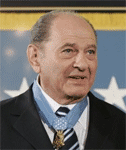Tibor Rubin
(1929 - 2015)
 |
Tibor Rubin was a Holocaust survivor and an American soldier awarded with the highest military honor, the Congressional Medal of Honor, for his service in the Korean War.
On September 23, 2005, 76-year old Rubin was finally awarded the nation's highest military accolade for gallantry in combat - the Congressional Medal of Honor. The Medal of Honor is awarded to those who displayed “conspicuous gallantry and intrepidity at the risk of his life, above and beyond the call of duty, in actual combat against an enemy armed force.” Rubin was the 18th Jewish recipient of the Medal of Honor since it was created during the Civil War by President Lincoln.
It took 55 years for Rubin's heroic actions to be honored by the country after finally breaking through the wall of government bureaucracy and prejudice towards minorites who fought in World War II and the Korean War. Rubin's story is none the less amazing for the wait.
Rubin, known as "Tibi" or "Ted," was born in a Hungarian shtetl called Paszto. At age 13, his family was rounded up by the Nazis, and he was sent to the Mauthausen concentration camp in Austria. Rubin survived, but his parents and his two sisters perished in the camp.
When Mauthausen was liberated by Allied troops, Rubin, then 15, swore that he would repay his liberators by going to the United States and fighting against the Germans. "I was going to go to the U.S. and join the U.S. army to show my appreciation ... It was my wish to fight alongside them," Rubin said.
In 1948, Rubin made it to the United States and tried to enlist in the U.S. Army only to be turned away because he failed the English test. He finally passed the exam in 1950 and was sent to fight on the frontlines of the Korean War.
At one point in the war, his company needed to find a route to retreat from their positions, so Rubin single-handedly defended a hill for 24 hours and held off scores of North Korean troops. This feat alone was enough to earn him four recommendations for the Medal of Honor and numerous other military awards. However, Rubin's commander - First Sgt. Artice Watson - who was described by many of Rubin's fellow soldiers as a "vicious anti-Semite" and often volunteered Rubin to go on the most dangerous patrol missions, ignored the orders to put through the paperwork to allow Rubin to receive the coveted Medal of Honor.
Some of the men in Rubin’s company were present when Watson refused to put through the order and they believe he did this because Rubin was Jewish. “I believe in my heart that First Sgt. Watson would have jeopardized his own safety rather than assist in any way whatsoever in the awarding of the medal to a person of Jewish descent,” wrote Cpl. Harold Speakman in a notarized affidavit.
In October 1950, Rubin and the survivors of his company were captured by the Koreans and placed into a POW camp. At the risk of being executed if caught, nearly every night Rubin would sneak out of the camp to get food for the desperate GIs. His acts of bravery and compassion kept between 35-40 soldiers alive until they were finally set free.
“He (Rubin) did many good deeds, which he told us were ‘mitzvahs’ in the Jewish tradition . . . He was a very religious Jew, and helping his fellow men was the most important thing to him,” said Sgt. Leo Cormier Jr., a fellow prisoner.
In the 1980s, nearly 30 years after he had been discharged, Rubin's army friends began protesting the Army's inaction and unfilled promises to recognize Rubin's bravery. The issue quickly reached members of Congress. Sen. John McCain (R-Ariz.) introduced a special bill on Rubin’s behalf in 1988. Former Rep. Robert Dornan (R-Calif.) pleaded for recognition of his constituent. Rep. Robert Wexler (D-Fla.) and former Rep. Benjamin Gilman (R-N.Y.) harassed the Pentagon and government agencies to act. The U.S. Army was forced to reexamine their discrimination policies towards awarding minorities during World War II and the Korean War.
The “Leonard Kravitz Jewish War Veterans Act” was passed in 2001 by Congress to aid in the recognition of minority fighters. Kravitz, the uncle and namesake of rock musician Lenny Kravitz, was killed manning his lone machine gun against attacking Chinese troops during the Korean War, allowing the rest of his platoon to retreat in safety. Kravitz was recommended for the Medal of Honor, but was downgraded to a lower decoration because of military prejudices.
“It would have been nice if they had given me the medal when I was a young handsome man,” mused Rubin. “It would have opened a lot of doors.” Rubin wanted to receive official recognition for his "Jewish brothers and sisters," and to prove to Americans that there was a "a little shmuck from Hungary, who fought for their beloved country. Now, it’s Mister Shmuck, the hero.”
Tibor Rubin died on December 5, 2015, at his home in Garden Grove, CA. He was 86 years old.
His Medal of Honor citation reads:
Sources: JTA (September 14, 2005):
Josh White, President Honors a Hero of the Korean War,
The Washington Post, (September 23, 2005);
Congressional Medal of Honor Foundation.


